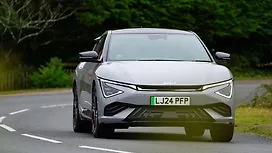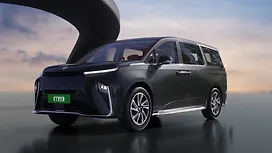Ford Figo

For – Potent engines, comfortable ride, safety features
Against – Ordinary cabin, lacks some important features, pricey top variants
Verdict – A big step-up over the still impressive old Figo
Final Rating – 4.12/5
Introduction

There is a lot riding on the small shoulders of this second generation Ford Figo hatchback. Although the EcoSport has been doing pretty well, it’s a small hatch that gets you big numbers in a developing country like India. The Ford Aspire sub-compact sedan has been well received by Indian car buyers and without a doubt has aroused a positive response in the market. In an effort to follow up on this good reaction, the American car maker has quickly launched the Figo, which is essentially the hatchback iteration of the Aspire. Like with the sedan, Ford has spared no effort in making the Figo as good as it can be. It’s spacious, well equipped, has strong engines and is quite nice to look at. Ford seems to have nailed it with the pricing especially for the base and mid variants and this definitely puts the Figo in good stead. However, price and equipment is not the only determining factor of a car’s success and the Figo has to deliver as an all-rounder.

Design and Style

The Figo hatchback looks identical to the Aspire sedan right up to the C-pillar. As a result, like with the sedan, the huge Aston Martin-like grille dominates the face of the Figo. The four slim chrome bars add a bit of flair to this aggressive front. Lower down in the front bumper, there are slimmer air dams that extend a bit further, and the sporty look is accentuated by cut-outs in which the fog lamps are accommodated. In profile, thanks to the hatch shape, the Figo looks more balanced than its sedan brother and the character line running across the side gives it a good stance. At the rear, Ford has kept things simple and uncluttered. But the neat wrap-around tail-lamps and the creases running across the boot lid helps it look interesting. The small 14-inch rims, though, looks a bit too small on such a large body.
Underneath, the Figo, like every other hatchback uses a monocoque chassis. It is based on the popular B2E platforms which also underpinned the recently discontinued Fiesta (2011) sedan. But despite having a similar 2491mm wheelbase as the Fiesta, the Figo is a massive 120kg lighter. This is thanks to Ford using lighter high-strength steel for the doors. As the roof is ribbed, Ford has managed to use thinner metal which has saved further weight. Although, Ford claims the car hasn’t lost any of the body rigidity, it doesn’t feel as solid as the Fiesta. This is particularly apparent with the door shut, which lacks the Fiesta’s or the EcoSport’s solid thunk.
The new Figo is suspended by a conventional independent MacPherson front and non-independent rear suspension layout. In terms of stopping power, Ford has employed discs up front and drums at the rear. Discs all round would have been welcome, considering the Figo is one of the fastest hatchbacks in the country.

Interiors

Once you enter the Figo’s cabin, you are greeted by the familiar Ford dashboard. The protruding centre console with its myriad buttons is a bit daunting to use, whilst the info screen is small and looks a bit outdated. In the lower Titanium variant, you miss the screen but instead you get the Ford Dock atop the centre console. It’s a rubberised phone holder which works really well and it’s a great feature for those who rely on their phones for GPS. The plastics, though, don’t have the richness you now expect in a big hatch but overall the materials feel hardwearing and the switchgear has a solid, workman-like feel. That apart, the dashboard looks stylish and we particularly liked the small-diameter sculpted steering wheel. At the front, there are plenty of storage spaces but strangely, there is only one cup holder and seatback pocket at the rear.

The front seats are well contoured and driving position is good. Even at the back, you’ll find no issue with the legroom on offer and headroom is decent as well. What you might not like is the narrow cabin and the lack of adjustable headrests. But the bench itself is supportive with a nice seatback angle. The boot, at 257 litres, is decent by segment standards and although you don’t get split seats, you can fold the rear seat flat for added luggage space.

Safety and Equipment

In terms of safety, the Figo is a bit of a mixed bag. While even the base variant comes equipped with the driver’s airbag as standard, only the top variants get ABS. The mid variants carry two airbags while the top-of-the-line Titanium + variant gets as many as six airbags as standard. The Titanium + variant also get other unique features like Ford’s My Key and Microsoft’s SYNC. The Figo automatic on the other hand comes only in the mid Titanium variant and misses out on these unique features, but it does come equipped with traction control. In terms of standard equipment, the Figo fares well. It is available with the essentials like climate control, power windows, CD player with aux-in and USB connectivity, Bluetooth telephony, steering mounted controls and others. What we sorely missed on the car though is a touchscreen interface, parking sensors and steering reach adjust.

Engine, Performance and Braking

The Figo, like the Aspire sedan, gets three engine options. There are two petrols - 1.2 litre with manual transmission and a 1.5-litre coupled to a six-speed dual-clutch gearbox. The diesel heart displaces 1.5litres and is good for nearly hundred horses.
Let’s start with the petrol automatic first. The Figo uses the same 1499cc petrol and six-speed dual-clutch gearbox combination as the one found on the Aspire and the EcoSport. It produces a very healthy 111bhp which is great considering how light the car is. In town, slotted in ‘D’ mode, the automatic gearbox upshifts early, maintaining a relatively low engine speed in a bid to improve fuel economy. A dab on the throttle gets it moving quite well, and when driven with care it is quite an ideal city car. But at part throttle the gearbox sometimes gets confused and this makes the power delivery quite jerky when you want to make quicker progress. You eventually learn to drive around this deficiency and when you go flat on the accelerator pedal, the Figo feels peppy and properly quick. The engine though does get quite thrummy when the car is driven in this manner and this is where enthusiasts will be disappointed. Even the gearbox though decent on its own is quite disappointing compared to other dual clutches. It is quite slow to respond and you can actually feel the gear changes which is a bit unusual for a hi-tech transmission. When you shift to sport mode, the gearbox does become a bit quicker as it holds on to gears for longer. You can also shift gears manually, but to do that the medium is a bit strange - there is a small button that’s all but hidden from view on the side of the gear lever. Still the Figo automatic is quite a quick car with 100kmph coming up in an impressive 11.3 seconds.

Surprisingly it’s the diesel that steals the show as far as performance is concerned. As soon as you start the engine you realise that this 1498cc engine is quite refined. This common-rail diesel churns out a very impressive 99bhp and 216Nm of max pulling power. Power delivery is pretty seamless and you can barely feel the turbo kicking in. There’s a gentle surge at around 1700rpm, followed by a strong push till the 3800rpm past which it’s best to upshift. What’s also good is that the engine has a fairly strong push so you don’t have to constantly work the smooth-shifting gearbox to make quick progress. The powerful engine combined with its relatively low weight means that without a doubt, the Figo is the fastest budget diesel hatch in the country.
The 0-100kmph sprint takes a scant 10.3 seconds! That makes it faster than the much more expensive VW Polo GT TDI too. Even its in-gear timing are very impressive with 20-80kmph in third gear taking just 10.53 seconds.
Even if the Figo doesn’t get the all-round disc setup, the brakes lend more than enough stopping power for this powerful hatch. What helps further is the linear feel at the pedal, which helps you know exactly how much pressure is required.

Ride and handling

Compared to the old Figo the new one has lost some of its sportiness. With a wider audience in mind, Ford has given ride and comfort precedence over involvement and handling. As a result, save for some firmness at low speed, the Figo remains unfazed and the refined suspension simply goes about its job, keeping you isolated from the biggest of potholes. Straight-line stability is impressive and high-speed manners are pretty good too. Although there is some floating motion over undulating surface at speed, it never gets uncomfortable and the driver always feels in control in most situations.
Granting Ford has gone soft with the new generation Figo it still feels quite agile by class standards. The car shows good poise when pushed hard and there is decent grip too. But the deterrent here is the steering which has a bit of slack, is slow and feels lifeless even when you are pushing hard.

Price and fuel economy

While the lower variants of the Figo are very well priced, the top-of-the-line Titanium + variant is quite expensive. The petrol Figo’s prices start from a low Rs 4.30 lakh for the base and go up to Rs 6.41 lakh for the Titanium + variant. The diesel prices start at Rs 5.30 lakh for the base and go up to a massive Rs 7.41 lakh for the top variant. The automatic transmission is only available in the 1.5 petrol and the lower Titanium variant and it retails at a competitive Rs 4.92 lakh.
In terms of fuel economy, the petrol automatic expectedly was the thirstier of the two. The 1.5 AT variant returned a respectable 11.7kpl in the city and 15.5kpl on the highway. The diesel variant, on the other hand, proved to be extremely efficient with figures of 14.1kmpl and 19.6kmpl for the city and highway cycles respectively. These impressive figures are also achieved thanks to the cars’ low kerb weight.

Verdict
Final Rating: 4.12/5

So has Ford delivered a product to trouble the might of the Maruti Swift and classy Hyundai Grand i10? After our exhaustive road test the Figo promises to be more than a match for its competitors. It is spacious, comfortable, looks good, has the strongest diesel engine and it delivers class-matching fuel economy too. What makes the Figo family even more attractive is the addition of a powerful automatic petrol option which should attract quite a few urban buyers. Yes, a more upmarket dash and better quality would have been welcome. But like with the old Figo, Ford has managed to price the new Figo really well, which makes it an even sweeter deal. Has Ford set the benchmark in the segment? We are getting Figo’s three direct competitors together to give you an answer. Stay tuned.
Pictures by Kapil Angane
Specifications
| CAR NAME | Ford Figo | |
| Variant | 1.5 AT Titanium | 1.5 TDCI Titanium + |
| ENGINE | ||
| Fuel | Petrol | Diesel |
| Installation | Front, transverse | |
| Displacement | 4 cyls, 1499cc | 4 cyls, 1498cc |
| Bore/stroke | 79.0/76.4mm | 73.5/88.3mm |
| Valve gear | 4 valves per cyl, DOHC | 2 valves per cyl, DOHC |
| Power | 111bhp at 6300rpm | 99bhp at 3750rpm |
| Torque | 136nm at 4250rpm | 215nm at 1750-3000rpm |
| Power to weight | 106.5bhp per tonne | 95.06bhp per tonne |
| Torque to weight | 131.14Nm per tonne | 206Nm per tonne |
| Gearbox | 6-speed dual-clutch auto | 5-speed manual |
| CHASSIS & BODY | ||
| Construction | four-door hatchback, monocoque | |
| Kerb weight | 1037kg | 1041kg |
| Tyres | 175/65 R14 | |
| Spare | Full-size | |
| STEERING | ||
| Type | Rack and pinion, electric assist | |
| Turning circle | 9.8m | |
| BRAKES | ||
| Front | Ventilated discs | |
| Rear | Drums | |
| Anti-lock | Yes | |
| PERFORMANCE & BRAKING | ||
| 0-20kph | 1.21s | 1.08s |
| 0-40kph | 3.00s | 2.53s |
| 0-60kph | 5.06s | 4.62s |
| 0-80kph | 7.89s | 5.71s |
| 0-100kph | 11.21s | 10.37s |
| 0-120kph | 16.14s | 15.34s |
| 0-140kph | 22.30s | 21.29s |
| 0-160kph | 34.20s | 31.00s |
| 0-180kph | NA | NA |
| 0-200kph | NA | NA |
| 20-80kph in kickdown/3rd gear | 6.58s | 10.53s |
| 40-100kph in kickdown/4th gear | 8.16s | 11.65s |
| 80-0kph | 27.80m 2.41s | |
| FUEL ECONOMY | ||
| City | 11.2kmpl | 14.8kmpl |
| Highway | 16.2kmpl | 19.8kmpl |
| Tank size | 40 litres | 42 litres |
| Range | 500km | 670km |
| INTERIOR MEASUREMENTS | ||
| Front | ||
| Legroom(Max/min) | 890/660mm | |
| Headroom(Max/min) | 980mm | |
| Shoulder room | 1350mm | |
| Seat base length | 530mm | |
| Backrest height | 630mm | |
| Rear | ||
| Legroom(Max/min) | 870/620mm | |
| Ideal legroom | 820mm | |
| Headroom | 930mm | |
| Shoulder room | 1290mm | |
| Seat base length | 470mm | |
| Backrest height | 570mm | |
| Boot | 257 litres | |
| Length/width/height | 3886/1525/1695mm | |
| Loading lip height | 710mm | |

![Ford Figo [2015-2019] Image Ford Figo [2015-2019] Image](https://imgd.aeplcdn.com/272x153/cw/ec/20230/Ford-Figo-Exterior-119015.jpg?wm=0&q=80)






















